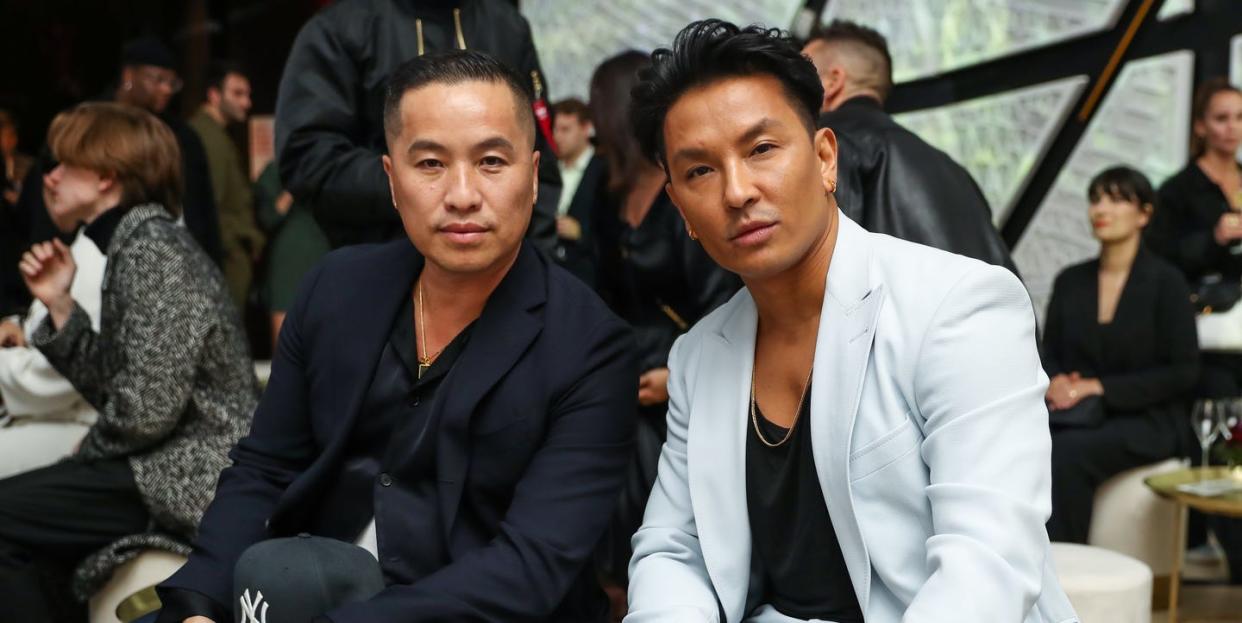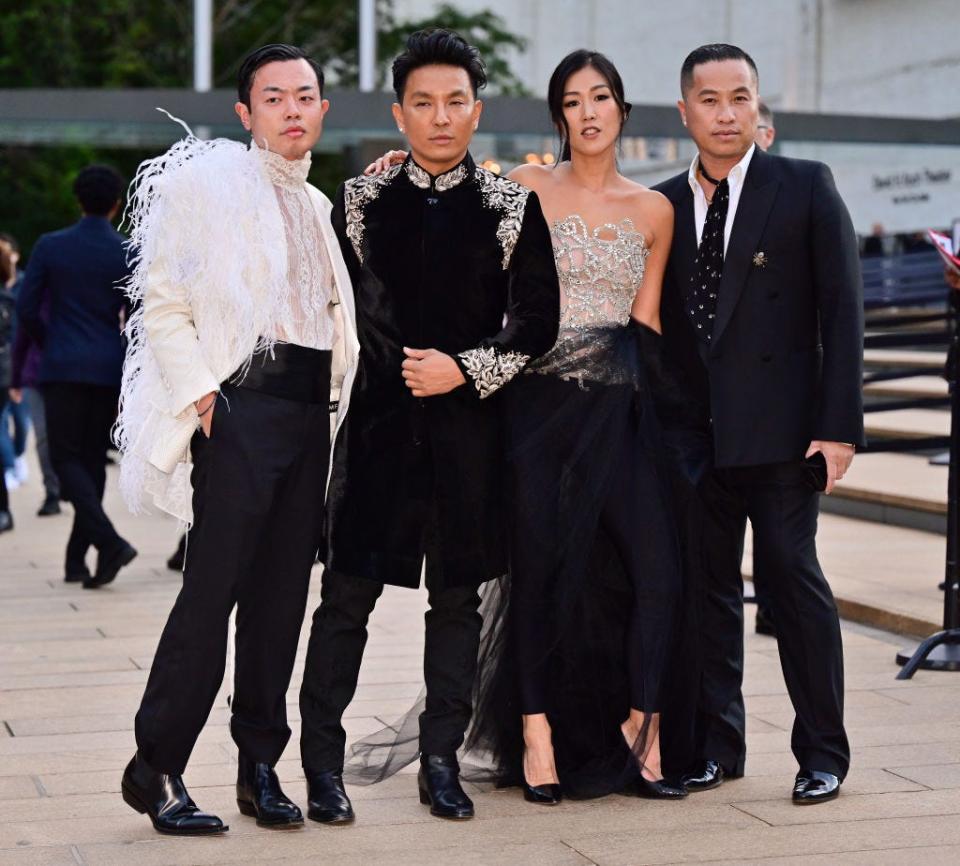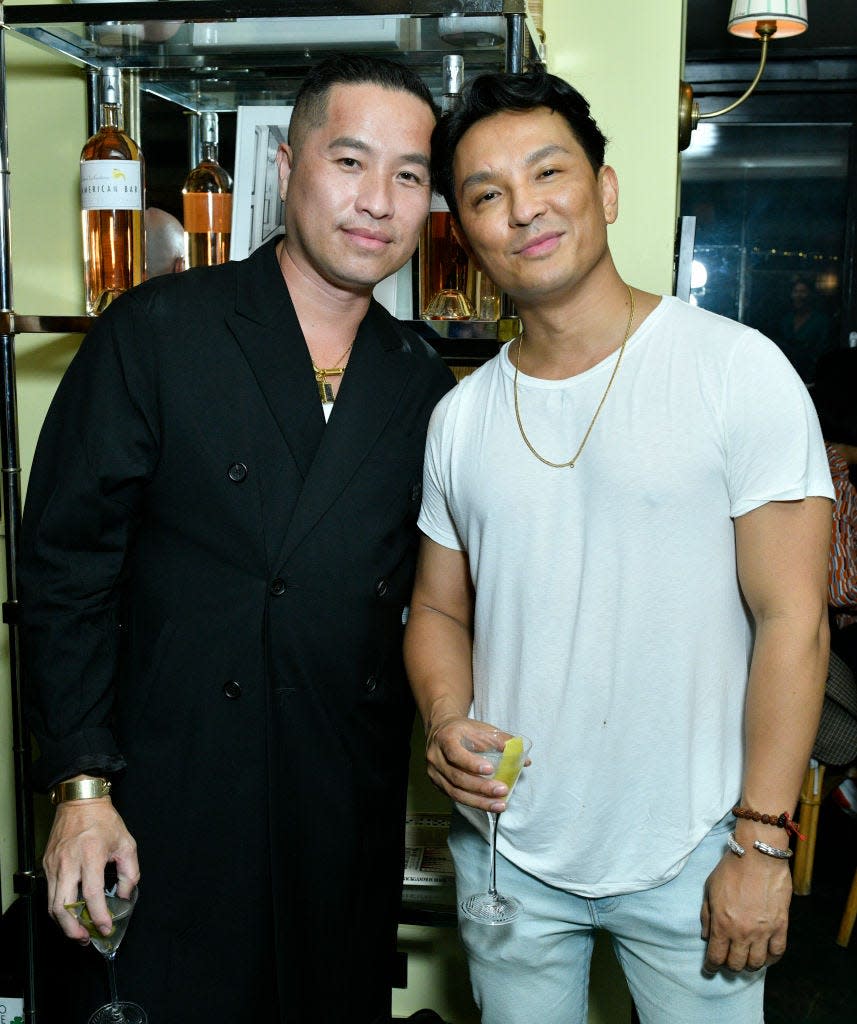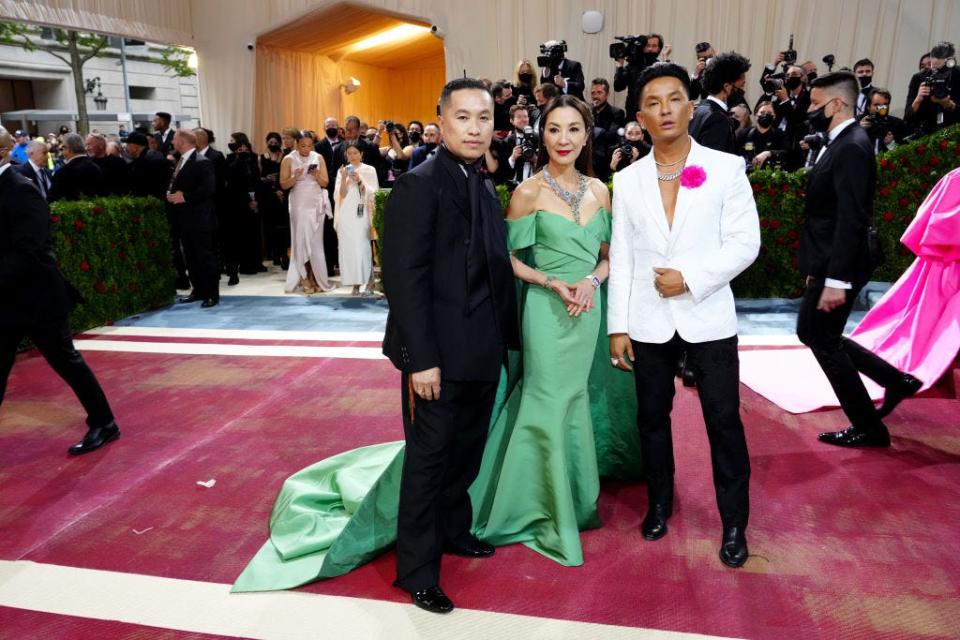For Phillip Lim and Prabal Gurung, Hiding Behind Their Designs Is No Longer an Option

It was just a couple weeks ago that Phillip Lim and Prabal Gurung graced the Met Gala with a crew of culturally-diverse stars dressed in Gurung's electric creations.
The two designers are adored in the fashion industry, having dressed everyone from Gigi Hadid and Miley Cyrus to Michelle Yeoh and Vice President Kamala Harris, but, in Lim's words, "That’s not true representation. We’re the fortunate ones—acceptable and passable within really small bubbles—but that doesn’t make for change. It's an exception to the rule—and we actually want to be the rule."

The longtime friends and founders of House of Slay—a funny, lighthearted web comic series featuring the duo as superheroes fighting to combat the "God of Darkness" aka racism—are partnering with the AAPI Victory Fund to launch the #OurVote brand, a project which will include extensive voter activation efforts, and merch designed by them: T-shirts, sweatshirts, a tote bag that reads "We vote as one nation indivisible; our voice, our power, our vote. The United States of America in Voting we Trust." The message, inspired by "The Pledge of Allegiance," is translated into every AAPI language as part of the pair's efforts toward seamless inclusion of Asian Americans into U.S. politics.
"Revolution is fragmented, and real change takes constant, consistent work," Gurung tells BAZAAR. In what many of us hoped would be a time of political harmony following the United States' last administration, we find ourselves forced to reckon with the potential end of Roe v. Wade, ongoing racially-motivated hate crimes, and a lack of representation still present in creative industries that claim to support "diversity" and "inclusivity," he adds.
Months away from the 2022 midterm elections, the U.S.'s political climate remains in a phase of absolute uncertainty, and the country's fastest growing ethnic group—Asian Americans—remains largely ignored, or "considered insignificant," Lim says.
"It’s really so important that we are the protagonists, we recenter that conversation that we’re culture makers, leaders, thought starters, game changers, and when we come together—the whole diaspora comes together—we change democracy," Lim adds.
The #OurVote brand will be unveiled at the inaugural AAPI Victory Rally and AAPI Next Generation Reception on May 20, on the anniversary of the Hate Crimes Act being signed into law by President Joe Biden. Guests will include top Asian American leaders across the country, such as Harris (who regularly wears Prabal Gurung), Boston Mayor Michelle Wu, Cincinnati Mayor Aftab Pureval, Representative Andy Kim, and Senator Tammy Duckworth, among many others. Japanese Breakfast will perform, and its lead singer, Korean-American musician Michelle Zauner, will be a guest speaker at the reception.
"It’s just going to be such a beautiful evening, and there’s never been anything like this, even close, for our community," AAPI Victory Fund President and CEO Brad Jenkins tells BAZAAR. "Our community is never center in this way. And honestly our ability to do this really does rest in us working with folks like Prabal and Phillip, because we can’t just be preaching to the choir, we have to be reaching Asian American voters in communities that love all of these guys. And we have to build that level of excitement, and we have to build that level of joy, because we’ve gone through so much trauma these last couple of years, that the evening really will be a celebration of Asian American joy."

Gurung and Lim's efforts to mobilize the 23 million-strong AAPI community ahead of the midterms may seem like something new for them, but it isn't. The designers (Lim was born in Thailand and is of Chinese descent, and Gurung is Nepalese-American) have made it part of their personal brands to address topics of social importance and stand by minorities—often speaking out even when many in the fashion industry would not.
"I’ve always believed that politics and fashion should go hand in hand, because it’s part of the culture. We can’t be dressing up women and selling clothes to women and not speak of women’s rights," Gurung says. "We can’t be booking trans models and hanging out with them and not speak for their rights. That’s how I look at it, and what the majority should be doing for us too. Unfortunately, unless the culture demands it, the industry doesn’t wake up."
Gurung notes that some of us—certainly the four of us having this conversation via Zoom—live in a bubble of liberal artists and high fashion and outspoken celebrities. But he also points out, "If you look the way we all look, all four of us," Gurung says, gesturing to Lim, Jenkins, and me, a Latina, "you know what it feels to feel othered. You know what it feels to be invisible, and also sometimes used as a token or a box to check for the majority when they want to come across like they’re inclusive."

Lim says his mixed Asian roots have always inspired his designs in ways that are not necessarily seen, but rather felt ("integrity, craftsmanship, holistic beauty, grit and undeniable desire"). But his hunger to represent in a more intentional way is more recent, and a result of the hatred he's seen directed toward his community.
"I remember in the beginning of starting out in fashion, everyone told you, 'Let your clothes speak for themselves,' but fast forward to today, it is important that your audience knows what you stand for and what you are willing to speak for and against," says Lim, who recently launched a collaboration with Panda Express to raise awareness about food insecurity within the AAPI community, and to celebrate the role of food and family in Chinese culture. "This is what I call authenticity and a point of view fueled by purpose. Gone are the days of hiding behind the façade of what you do as an occupation. It is now about what you do as a citizen."
Now, for the first time, he and Gurung are using their stance in the high-fashion world to push for voter activation among young Asian Americans. "Never before have we merged the spaces of fashion and politics in this way, so intentionally," he says. "This moment is the first of its kind, because in our industry it’s always been, 'Hush hush, keep your point of view, your political sides, to yourself.' But we’re out here speaking with you to amplify it and say, 'No, this is the moment that is so critical that we join forces, become our own superheroes, activate that power from within, to ensure democracy for all.'"

He insists that while he and Gurung are speaking for the AAPI community they are part of, they feel that every U.S. minority is part of the same family, and we all need each other to ensure we are listened to, represented, and respected in the long run.
"As we know, in these past two years, at any moment, hate and this sick system of racism can turns its ugly, nasty head on any one of us," Lim says. "And so we have to make sure we champion each other. It is up to all of us to come together to make sure we vote, because we can feel the darkness creeping up already."
You Might Also Like


